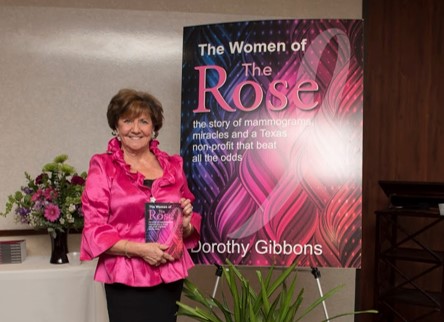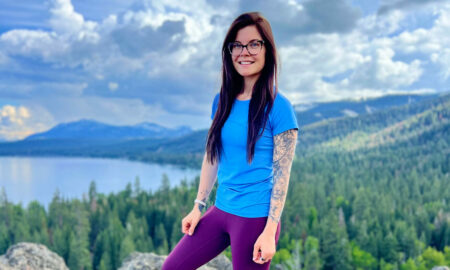

Today we’d like to introduce you to Dorothy Gibbons.
So, before we jump into specific questions about the business, why don’t you give us some details about you and your story.
The Rose was not my first career choice but I am so thankful that “She” picked me to be her co-founder and her leader. What began as a basic part of my marketing job at Bayshore Medical Center in Pasadena TX almost immediately morphed into an avocation that would consume the next 35 years of my life.
When Dr. Dixie Melillo, one of the few women to complete a surgical residency in the early ‘80s, established a practice at Bayshore, she brought with her a passion about mammography and its importance in early detection. It was my job to promote Dixie and her education series within the community and to market Bayshore’s new dedicated breast center.
By the mid-‘80s, the oil bust crippled Houston and forced many out of work and homes. No work meant no insurance coverage. It was a time long before pink ribbons were synonymous with breast cancer and before mammography was used as routine screening. It was also a time when advanced breast cancer was rampant and the worst cases always found their way to Dixie’s office. The women’s stories were always the same: no money, no insurance and they had no idea that the lump in their breast would kill them.
In 1985, a fateful meeting with journalist and breast cancer advocate Rose Kushner changed the course of history for both Dixie and me, and for the nearly one million women we were yet to serve. Rose challenged us to quit moaning about the sad state of awareness and the number of women dying. She scorned our attempts to educate without offering access to care and told us to get off our ‘duffs,’ go start a non-profit and take care of those women. Rose continued to hound me for over a year until I applied for the non-profit status.
And so, in 1986, it began. In founding The Rose, we were resolved that it would be different. For Dixie, the diagnosis and care of breast cancer needed to be done ‘right.’ She had seen too many women undergo brutal total mastectomies only to be told they should be grateful they were alive and chastised when they ask about reconstruction. For me, women, rich or poor, needed to be treated ‘right.’ After watching my mother die in a charity hospital from metastatic cancer that would have been treatable, I learned at age 20 what it meant not to have insurance or financial resources.
We both wanted a place where all women had the same access to breast health care, regardless of their ability to pay for services.
From the beginning, The Rose used a sustainable business model: every insured procedure helped cover some of the costs of the uninsured. Grants, individual gifts and fundraisers are needed to supplement care, especially the costly diagnostics required by the uninsured and to purchase capital equipment.
For some women, going to The Rose is a way they give back to their community, knowing their paid mammogram is helping an uninsured woman. For others, going to The Rose meant early detection. For the most fortunate, The Rose saved their life and gave them decades to make many new memories.
We’re always bombarded by how great it is to pursue your passion, etc. – but we’ve spoken with enough people to know that it’s not always easy. Overall, would you say things have been easy for you?
A smooth road? Of course, not.
Struggles? Too many to list.
A very small percentage of nonprofits that started in the mid-’80s are in existence today. I know The Rose is the exception, not the norm, and yes we live in a world of highs and lows but regardless, we have kept true to our mission.
Funding: Securing adequate funding to serve the women needing help has been one of our greatest struggles. Texas has the highest uninsured rate in the nation and services for uninsured women who are beyond childbearing age are woefully lacking. The women we serve are working women, usually at low paying jobs which do not offer insurance. They are the ones who cannot look to the State for help. In fact, Medicaid does not cover most low-income women unless they are pregnant or they just had a child.
Our first fundraiser was a Bachelors Auction that raised $7000. I’m not even sure we could do that type of event today but events have been important throughout our 33-year history. Events combined with grants from philanthropic organizations and the ever-present generous individuals have allowed us to serve.
What we do costs money—lots of it! In hospitals, low reimbursed procedures such as mammography lead to other higher reimbursed procedures such as surgery or radiation. That isn’t the case for The Rose. Not only is mammography one of the most highly regulated and costly medical businesses around, but we also give 25% of all our services away for FREE.
Being a nonprofit, a constant struggle has been overcoming the reputation as a nonprofit. Even though all the hospitals in the medical center are non-profit, for a free-standing facility whose mission is access to care for all there exists a question about the level of services. All our publicity centers around our services and programs for the uninsured, as it should.
Yet, it is our insured population that creates our foundation. It would be impossible to serve so many uninsured women without them. So, we must offer the highest level of care to attract and maintain our insured clients. We must ‘look’ as attractive and be as spacious as all the other leading centers. We must have the best there is… in staff, in physicians, and in equipment. That is why achieving the Breast Imaging Center of Excellence was so important. It says to all patients that we’ve met standards over and above accreditation, over and above what is required.
For me, personally, The Rose has required a commitment beyond what at times I had to give. I made it more important than anything else in my life and along the way lost certain parts of my life, of myself. Worth it? That remains to be answered.
My greatest fear is that some woman is living with cancer growing in her breast—one that will take her life— only because she hasn’t heard about The Rose. She doesn’t know help is available.
But I’m especially touched when I meet people at events or after one of my talks and they tell me The Rose helped my neighbor or mother or wife. My greatest reward is when one of them tells me “The Rose saved my life.”
For some of our more interesting ‘struggles’ read my book: The Women of The Rose, published in 2015.
We’d love to hear more about your work.
What originally started with a donated mammography system in a 900 sq. ft. storefront with two employees is now a Breast Imaging Center of Excellence, a designation held by only 14 facilities of the seventy-plus centers in Houston. Most importantly, The Rose is the only free-standing, non-hospital based organization to earn this distinction. As a nonprofit The Rose ranks in Houston’s top 25 and has consistently received top charity ratings.
The Rose’s two full service and comprehensive diagnostic centers and its mobile mammography fleet, that travels throughout 40 counties in southeast Texas, offers screening, diagnostic workups, ultrasound, and stereotactic tissue biopsies and physician consultations. All procedures are digital and mammography is advanced 3D tomosynthesis.
The most important work we do is Patient Navigation. When an uninsured woman is diagnosed, our navigators help her access timely and appropriate treatment. Navigators ensure that the woman who is most at risk to be lost in a maze of traditional healthcare is cared for as well as an insured woman.
Patient Navigators start by being with the woman when she receives her diagnosis. She’s there to make that critical connection and to reassure the woman that she isn’t alone. Next, she handles completing the necessary paperwork to ensure the woman is approved through the State’s Breast and Cervical Cancer Services Program. Once approved, the navigator makes those critical first appointments with physicians, hospitals and radiation centers. Sometimes navigation involves being sure the woman is able to physically get around the medical center or any hospital and that means our navigators accompanying her on the initial consultations. Intensive education offered in the patient’s first language and, when needed, geared specifically for young children and the family, is provided at the time of diagnosis and throughout treatment. Physicians tell us that patients from The Rose are “the best prepared and more knowledgeable” about their disease and treatments than any others.
Navigators act as translators and find resources for other services such as food, help with bills, daycare, and transportation that the family needs and follows the patient until she completes treatment.
The Rose employees a staff of 125 (124 women and one male) consists of the most dedicated and caring people around. That’s not just me talking but the overarching opinion of our patients. Most employees have years of experience, every department boasts tenured staff. Our mammography technologists are highly trained and credentialed and many are trained in multiple modalities. Our ten member medical staff all work onsite with fellowship trained radiologists leading protocols. All are recognized for their expertise and ‘bedside’ manner. They are present for all diagnostic procedures and ready to explain their findings.
We have the trust of over 3,000 referring physicians who routinely recommend their patients use The Rose.
Hundreds of volunteers round out our team and we couldn’t make it without them.
Employees, physicians, and volunteers work together serving 40,000 women and men annually (yes, men come too and are diagnosed) and extend free services to nearly 7,000 uninsured women as well as provide deep discounts to over 4,000 women who are self-paid and need our cash discount program.
What were you like growing up?
Quiet, smart and responsible.
Contact Info:
- Address: The Rose Southeast
12700 N Featherwood Dr., Suite 260
Houston, TX 77034The Rose Galleria
5420 West Loop South, Suite 3300
Bellaire, TX 77401 - Website: www.therose.org
- Phone: 281-484-4708
- Email: info@therose.org
- Instagram: https://www.instagram.com/therosehouston
- Facebook: https://www.facebook.com/TheRoseBreastHealth
- Twitter: https://mobile.twitter.com/therosehouston








 Image Credit:
Image Credit:
Neil Productions, Rena Iglehart, Elda Gavidia
Getting in touch: VoyageHouston is built on recommendations from the community; it’s how we uncover hidden gems, so if you know someone who deserves recognition please let us know here.

















